Related Research Articles

Ferdinand Rudolph von Grofé, known as Ferde Grofé was an American composer, arranger, pianist, and instrumentalist. He is best known for his 1931 five-movement symphonic poem, Grand Canyon Suite, and for orchestrating George Gershwin's Rhapsody in Blue for its 1924 premiere.
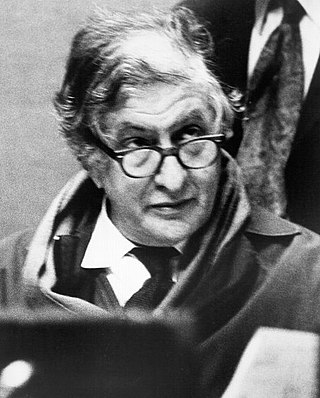
Bernard Herrmann was an American composer and conductor best known for his work in film scoring. As a conductor, he championed the music of lesser-known composers. He is widely regarded as one of the greatest film composers. Alex Ross writes that "Over four decades, he revolutionized movie scoring by abandoning the illustrative musical techniques that dominated Hollywood in the 1930s and imposing his own peculiar harmonic and rhythmic vocabulary."
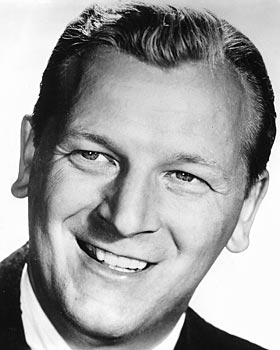
Leslie Thompson Baxter was an American musician, composer and conductor. After working as an arranger and composer for swing bands, he developed his own style of easy listening music, known as exotica and scored over 250 radio, television and motion pictures numbers.

Gunther Alexander Schuller was an American composer, conductor, horn player, author, historian, educator, publisher, and jazz musician.
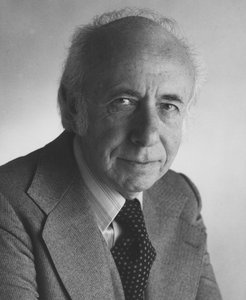
Morton Gould was an American composer, conductor, arranger, and pianist.
Jean René Désiré Françaix was a French neoclassical composer, pianist, and orchestrator, known for his prolific output and vibrant style.

Thomas William Ellis Smith is a Scottish jazz saxophonist, composer, and educator.
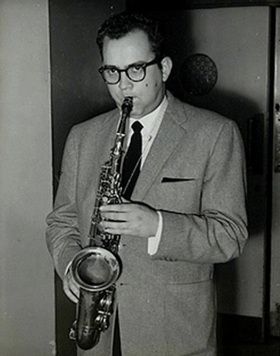
Leonard Niehaus was an American alto saxophonist, composer and arranger on the West Coast jazz scene. He played with the Stan Kenton Orchestra and served as one of Kenton's primary staff arrangers. He also played with Ray Vasquez and trombonist and Vocalist, Phil Carreon and other jazz bands on the U.S. West Coast. Niehaus had a close association as composer and arranger on motion pictures produced by Clint Eastwood.
Jeff Beal is an American composer of music for film, television, recordings, and the concert hall. Highly regarded as a jazz instrumentalist and versatile composer, Beal creates music that often incorporates a synthesis of improvisatory and composed elements.
William Joseph Russo was an American composer, arranger, and musician from Chicago, Illinois, United States.
Nadine Dana Suesse was an American musician, composer and lyricist.
Pablo Ziegler is a Grammy Awards winning Argentine composer, pianist, arranger based in New York City. He is an exponent of nuevo tango, and has worked extensively as Ástor Piazzolla's regular pianist from 1978 until Piazzolla's retirement for health reasons in 1989. During their collaboration, they performed with Milva, Placido Domingo, Gary Burton among others. He played with Piazzolla's re-formed Conjunto 9 in 1983 for his Teatro Colón concert with the Buenos Aires Philharmonic. In 1985 Ziegler composed the music for the film Adios Roberto, and in 1990, he established the New Tango Quartet.
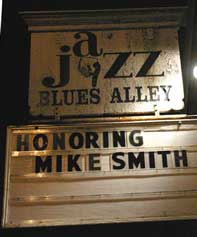
Michael Scott Smith was an American jazz drummer and percussionist. Based in the Washington D.C. - Baltimore area for most of his 40-year career, Smith played with many jazz greats including Dave Liebman, Herbie Hancock, John Abercrombie, Randy Brecker, Tommy Flanagan, Billy Eckstein, Astrud Gilberto, Freddie Hubbard, Herb Ellis, and Milt Jackson.
Aaron Zigman is a classically trained American composer, producer, arranger, songwriter, and musician who has scored music for films including The Notebook, The Company Men, Bridge to Terabithia, John Q., The Proposal, Flicka, For Colored Girls, Flash of Genius, Sex & the City, Alpha Dog, and Escape from Planet Earth. He has also written, arranged and produced over 50 hit albums, and co-written songs with legendary and contemporary artists including Quincy Jones, Christina Aguilera, Phil Collins, Was, John Legend, Dionne Warwick, Ray Charles, Natalie Cole, Aretha Franklin, Tina Turner, and Seal.
Donald John Sebesky was an American composer, arranger, conductor, and jazz trombonist. He was a multi-instrumentalist and could play a number of other instruments: keyboards, electric piano, organ, accordion, and clavinet.
William James Finegan was an American jazz bandleader, pianist, arranger, and composer. He was an arranger in the Glenn Miller Orchestra in the late 1930s and early 1940s.

Emily Jordan Bear is an American composer, pianist, songwriter and singer. After beginning to play the piano and compose music as a small child, Bear made her professional piano debut at the Ravinia Festival at the age of five, the youngest performer ever to play there. She gained wider notice from a series of appearances on The Ellen DeGeneres Show beginning at the age of six. She has since played her own compositions and other works with orchestras and ensembles in North America, Europe and Asia, including appearances at Carnegie Hall, the Hollywood Bowl, the Montreux Jazz Festival and Jazz Open Stuttgart. She won two Morton Gould Young Composer Awards, the youngest person ever to win the award, and also won two Herb Alpert Young Jazz Composers Awards.
Third stream is a music genre that is a fusion of jazz and classical music. The term was coined in 1957 by composer Gunther Schuller in a lecture at Brandeis University. There are many ways to define third-stream music. It could refer to a group of jazz musicians playing solely, or a jazz soloist performing with a symphony orchestra, as long as the musicians are able to interpret and play jazz music. Improvisation is generally seen as a vital component of third stream. In third-stream music, composers incorporated elements of classical music, such as the use of jazz instruments and classical music forms, into their jazz compositions. The fusion of jazz and classical music is also viewed as "born out of a reciprocal interest: the interest of the classical community in the developments in jazz music and the interest of the jazz community in the advances of classical music." The innovative idea of fusing jazz and classical music pushed the boundaries of traditional classical music and introduced a new genre that blends the two styles into a unique hybrid form.
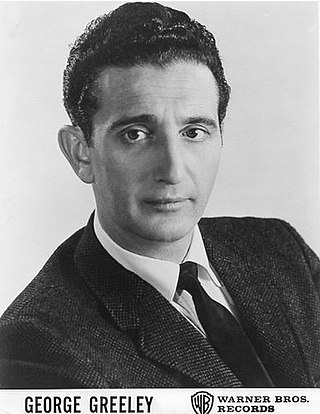
George Greeley was an Italian-American pianist, conductor, composer, arranger, recording artist and record producer who is known for his extensive work across the spectrum of the entertainment industry. Starting as an arranger and pianist with several notable big bands in the 1940s, he segued into the Hollywood radio scene, working on several nationally broadcast variety programs. After conducting an Army Air Force Band during World War II, he was hired by Columbia Pictures as a staff pianist and orchestrator. He worked as pianist on several hundred motion pictures, worked with many famous composers orchestrating their soundtrack compositions, and created original compositions of his own in several dozen movies. It was Greeley's hands that performed the piano parts that Tyrone Power mimed in The Eddy Duchin Story. Concurrent with his work at Columbia Pictures, George Greeley also worked at Capitol Records as music director, pianist, and conductor for many artists such as Gordon MacRae, Jane Powell, Jo Stafford, Frankie Laine, and Doris Day. He was hired in the late 1950s by the newly established Warner Brothers Records. George Greeley arranged, orchestrated and performed as primary artist for a series of hit recordings entitled "Popular Piano Concertos." As music tastes changed in the late 1960s, Greeley had already moved into television, composing themes and music for popular TV series like My Favorite Martian,The Ghost and Mrs. Muir,Nanny and the Professor, and Small Wonder. He performed as featured piano soloist and as guest conductor in concert appearances around the world. He died from emphysema at age 89 in Los Angeles, California.

Andrew Gerle is an American composer and pianist known for his musical adaptation of "Meet John Doe" with librettist Eddie Sugarman which premiered at the Ford's Theater in Washington. He is the recipient of four Richard Rodgers Awards administered by the American Academy of Arts and Letters and a Jonathan Larson Grant. His opera "The Beach", a collaboration with librettist Royce Vavrek was presented on May 14, 2011 as part of New York City Opera's VOX Contemporary American Opera Lab.
References
- ↑ "All About Jazz Music, Musicians, Bands & Albums". Allaboutjazz.com. Retrieved July 29, 2020.
- 1 2 "David Kane: composer, pianist, Educator". Davidkanemusic.com. Retrieved July 29, 2020.
- ↑ Peterson, Iver (May 19, 2004). "17-Year Cicadas Answer Cue With a Crunch Across the East". The New York Times . Retrieved July 29, 2020.
- ↑ "Archived copy". Newsweek . Archived from the original on May 25, 2015. Retrieved May 20, 2015.
{{cite web}}: CS1 maint: archived copy as title (link) - ↑ "Strathmore to feature 'Emergence: The Cicada Serenade'". Archived from the original on May 25, 2015. Retrieved May 20, 2015.
- ↑ "David Kane". IMDb.com. Retrieved July 29, 2020.
- ↑ "jazzbooks.com: Product Details". www.jazzbooks.com.
- ↑ "The Science of Improv". Archived from the original on June 25, 2016. Retrieved May 20, 2015.
- ↑ "UAM adds master's degree in jazz studies". August 6, 2015.
- ↑ "CDS".
- ↑ "Selected Discography".
- ↑ "Highwire".
- ↑ "STORE". December 6, 2018.